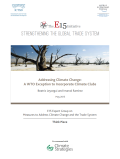In the debate on climate change, methods of producing products and energy are of paramount importance. While the product or the form of energy resulting may be the same, diverging production processes and methods of production may have a critical impact on climate change mitigation, and environmental and human concerns in general. Some may be detrimental, some may be beneficial. They vary from each other, notwithstanding that the final products cannot be distinguished from each other. This paper explores the extent to which renewable energy and non-renewable energy, in particular based on fossil fuels, may be regulated, labelled, or taxed differently, or whether the likeness of the product prohibits doing so in international trade law relating to production and process methods (PPMs). In doing so, the paper mainly focuses on the production of electricity from fossil fuels (coal, oil, and gas), atomic energy, and renewable energy (hydropower, thermal power, wind, solar and tidal energy, and biomass).

Despite diverse efforts in the past two decades, countries have not been able to create an international climate change regime that effectively addresses the challenges at stake. Meanwhile, the Arctic Ocean keeps melting, an area the size of Costa Rica is lost to deforestation every year, and low-lying islands could disappear by 2050 due to a rise in sea level. There are several other huge challenges posed by climate change, which urgently call for serious international action.
The ‘circular economy’ is gaining momentum as a concept in both academic and policy circles, and circular business models have been linked to significant economic benefits. This paper identifies barriers and enablers to adopting circular economy business practices, and presents key messages for policy-makers. It draws on input from a literature review, on discussions held in the context of the GreenEcoNet project and on an analysis of two SME circular business models.
The greening of the economy is a shared goal for advanced and less advanced economies alike, particularly where sustained and inclusive employment is an objective for policy-makers. However, the challenges of such greening, and the implications for employment and skills, vary across regions and countries. In the transition from high- to low-carbon production, labour market impacts are becoming more evident and changes will likely affect all workers. However, while these changes may be minor for the majority, they will be substantial for a small number of industries and professions. Preparation for the adjustments is essential to take full advantage of green growth opportunities. Policy-makers today are concerned with how to help their economies to move away from a low-level approach (low job quality, low environment protection, low skills), towards high skills, high productivity, and sustainable economies. This report provides evidence and policy analysis to foster an equitable shift to greener economies and more sustainable societies.
Adaptation presents developing countries with the ultimate dual challenge – building a rapidly evolving, sustainable economy within an environment increasingly altered by the impacts of climate change. To meet this challenge, adaptation policy must find balance and create synergy between the two, as climate resilience and economic resilience go hand in hand.
Economic development is associated with structural change, including an evolving sector composition, the emergence of new comparative advantages and skills, and shifts in consumer demand as a result of rising incomes – all of which has implications for adaptation. Existing attempts to adapt developing economies to climate change have nonetheless ignored these economic dynamics. Current approaches to adaptation often seek to preserve current structures, for example by protecting agricultural output, which neither acknowledges nor takes advantage of the fact that the status quo is evolving.
